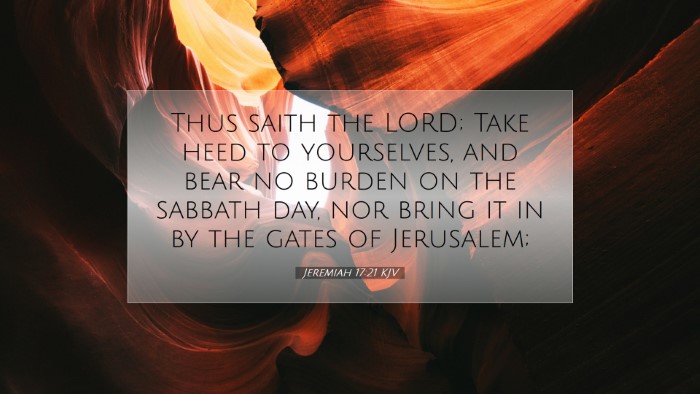Commentary on Jeremiah 17:21
Verse: "Thus saith the LORD; Take heed to yourselves, and bear no burden on the sabbath day, nor bring it in by the gates of Jerusalem." (Jeremiah 17:21, KJV)
Introduction
The verse under consideration emphasizes the importance of Sabbath observance among the people of Israel. It reflects both a command from God and a reminder of the covenant relationship between the Lord and His people. In many ways, Jeremiah's words serve as both a plea and a warning to the people who had strayed from their spiritual commitments.
Exegesis of the Verse
This verse can be examined from various perspectives, including historical, theological, and practical applications. By understanding the broader context of Jeremiah's ministry and the significance of the Sabbath, one can appreciate the depth of this command.
1. Historical Context
Jeremiah prophesied during a tumultuous time in the history of Judah. The nation was facing impending judgment due to its idolatry, social injustice, and neglect of God's laws. The Sabbath, a day of rest and worship instituted by God in creation (Genesis 2:2-3) and later codified in the Ten Commandments (Exodus 20:8-11), had been largely disregarded. In this context, Jeremiah's message serves as a call to return to faithful observance of God's commandments.
2. Theological Significance
In this verse, we find a profound theological truth concerning human behavior and divine command. God is emphasizing the need for His people to distinguish between sacred and secular time. The Sabbath was not merely a day off; it was a divine institution designed for spiritual renewal and societal justice.
God's call to "take heed" (Hebrew: שָׁמַר, shamar) signifies a watchfulness necessary to observe divine ordinances. The burdens referred to are likely both physical and spiritual; they symbolize the weight of sin and distraction that leads individuals away from God's intended purpose for rest and worship.
3. Practical Applications
Pastors, students, and theologians can derive several practical implications from this verse:
- Rest as a Commandment: The command to refrain from bearing burdens on the Sabbath can be seen as a call for contemporary believers to prioritize rest and worship in their lives, thereby acknowledging God's sovereignty over time and work.
- Spiritual Vigilance: "Take heed to yourselves" serves as a reminder of the need for self-examination and awareness of distractions that can cloud our spiritual health.
- Community and Justice: Observing the Sabbath can remind us of our responsibilities to one another in the community, ensuring that we do not contribute to the burdens of others, particularly through unjust labor practices or neglect.
Insights from Commentators
Matthew Henry
Matthew Henry emphasizes that God restricts His people from performing secular activities on the Sabbath to underscore the sacredness of this day. He notes that the act of "bearing burdens" is a metaphor for engaging in sinful practices. By observing the Sabbath properly, believers not only honor God, but they are also refreshed spiritually, allowing for deeper communion with the divine.
Albert Barnes
In his commentary, Albert Barnes highlights the spiritual implications of neglecting the Sabbath. He comments on how the act of bringing burdens into Jerusalem through its gates signifies a failure to respect holiness. Barnes asserts that when people disregard the holy day, they not only harm their relationship with God but also the wellbeing of the community as a whole. The implications of the message extend beyond personal piety, indicating a societal responsibility toward holiness and justice.
Adam Clarke
Adam Clarke elaborates on the dimensions of the Sabbath's importance. He stresses that it embodies the essence of the covenant, where the people of God are to reflect on their identity as God's chosen ones. Clarke points to the historical precedence for this command, reminding readers that neglecting the Sabbath contributed to the spiritual decay of Judah. His insights pivot towards the relevance of Sabbath observance in cultivating a continuous relationship with God.
Conclusion
Jeremiah 17:21 invites us to reflect on our understanding of time and rest in the light of divine expectation. The call to "take heed" resonates across millennia, confronting us with our contemporary issues of busyness, distraction, and disconnection from our spiritual roots. Ultimately, this passage is a reminder that observing the Sabbath is not merely about physical rest; it is about spiritual renewal and dedication to God’s commands. As such, it urges both individual and communal practices that honor the sacredness of life in relationship with a holy God.


